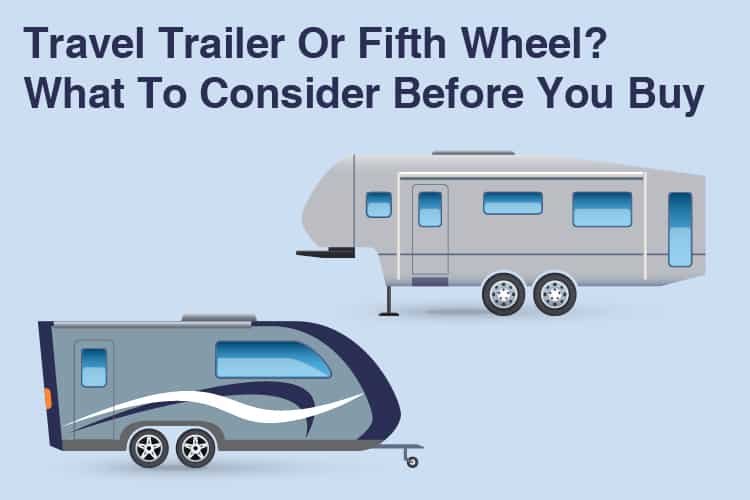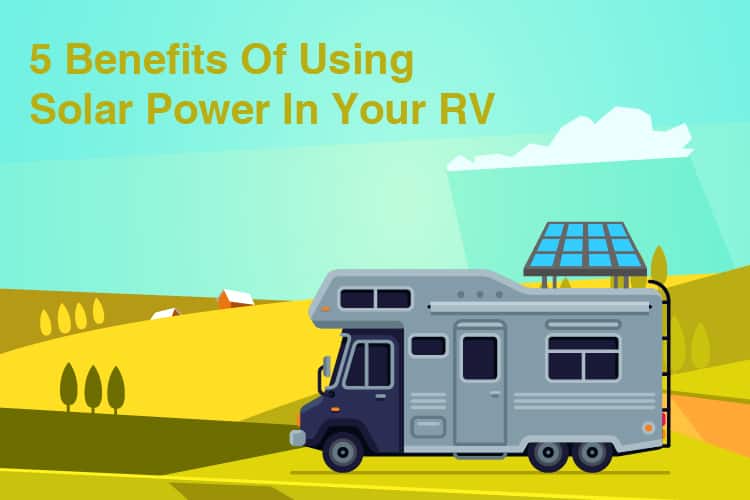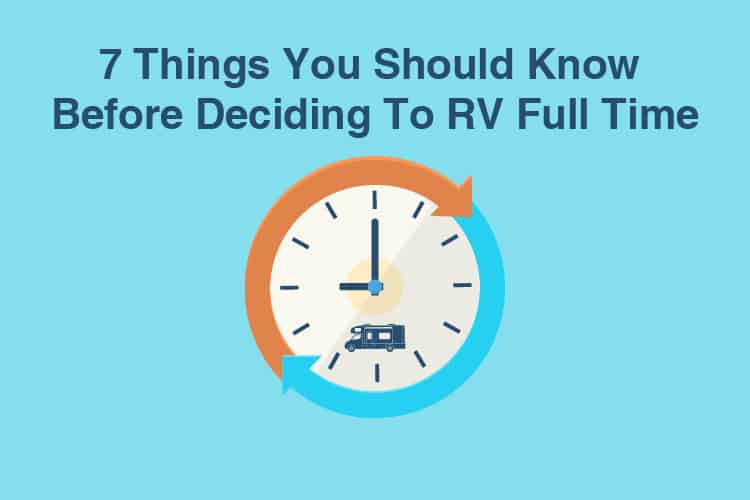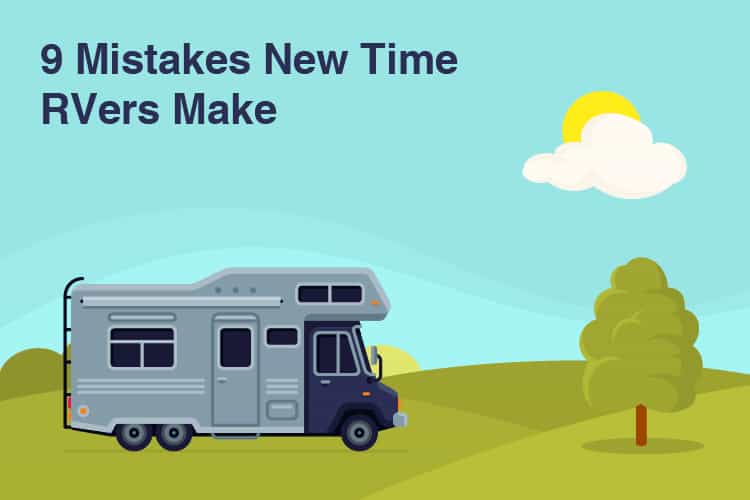So you are planning to jump into the world of RVing. Maybe you are thinking of a family trip to the Grand Canyon.
Maybe you want to abandon your mortgage for an exciting lifestyle of permanent RV travel as some have done.
Here is some helpful information about that. But first, you have to decide how you want to use your new RV vehicle.
What Are My Camping Goals?
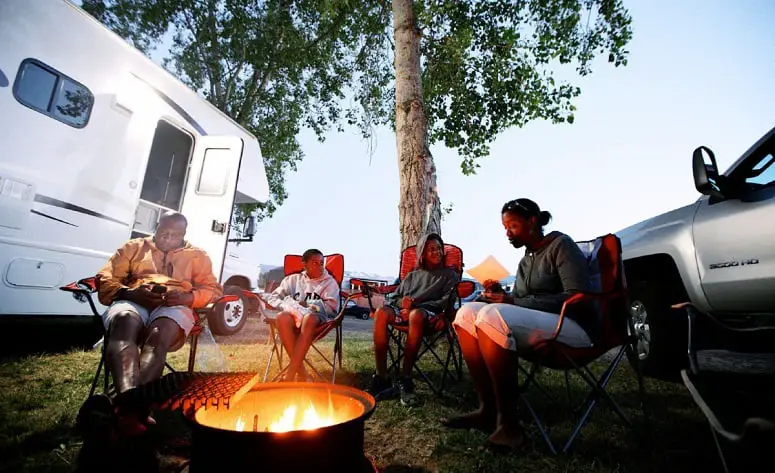
You have dreams of sitting around a campfire making s’mores.
Laughter, singing, telling stories while the aroma of roasted marshmallows fills the air.
Maybe you are cooking fish you caught in the stream that day, some Colorado rainbow trout perhaps. Corn on the cob in foil sits in the coals; it will be good eating.
But roughing it entirely is not your goal; you prefer to actually go to bed in a comfortable bed rather than sleep under the stars and worry about bears getting your food, and maybe you! That’s why you decided on an RV.
Purchasing the right RV vehicle requires you to answer many questions.
Are you planning on taking a cozy camping trip with just your honey? Are you taking six kids and a dog?
Where are you going? How long will you stay at the campsite?
Will you be dry camping or need hookups and a generator?
What season are you taking your trip in; what weather and road conditions will you encounter? You also need to think about the terrain you are driving over: particularly open roads or windy mountain ones.
Are you planning on an RV lifestyle or is your trip a one-off?
What do you have as a towing vehicle?
Where will you park your trailer or fifth wheel? What is your budget? The answers to these and other considerations will largely determine what you buy.
What Is The Difference Between A Travel Trailer And A Fifth Wheel?
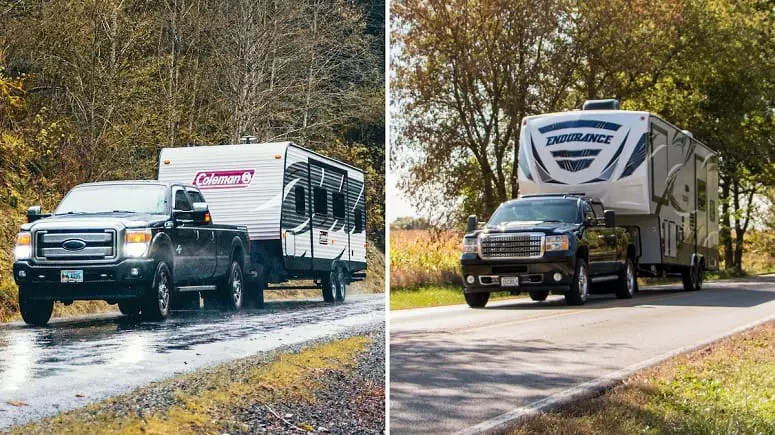
A travel trailer is a smaller camper using a standard hitch.
A fifth wheel is a much larger RV vehicle, using a special hitch called a fifth wheel hitch.
Fifth wheel hitches were developed for horse-drawn carriages in the 19th century and have evolved from there.
Fifth wheel hitches are the hitch of choice for semi trailers for commercial use, due to their strength and stability. High-end hitches have automated processes for hitching the load to the tow engine.
A fifth wheel hitch for an RV will be much simpler but still provide that extra stability and smoothness.
A standard hitch comes in several classes, from those used to tow lightweight objects to hitches used for much larger loads.
The basic design is that a ball is mounted on the object to be towed, which is then hooked to the tow vehicle by a “tongue” that goes over the ball.
In general, Class IV hitches are required to tow most travel trailers.
Fifth wheel hitches, on the other hand, use a partial wheel part instead of a ball part. A vertical steel pin called a kingpin is coupled to the partial wheel part.
When the tow vehicle turns around corners, the kingpin moves inside the partial wheel part, which stays fixed. This design is used for the heaviest loads.
General Properties Of Travel Trailers
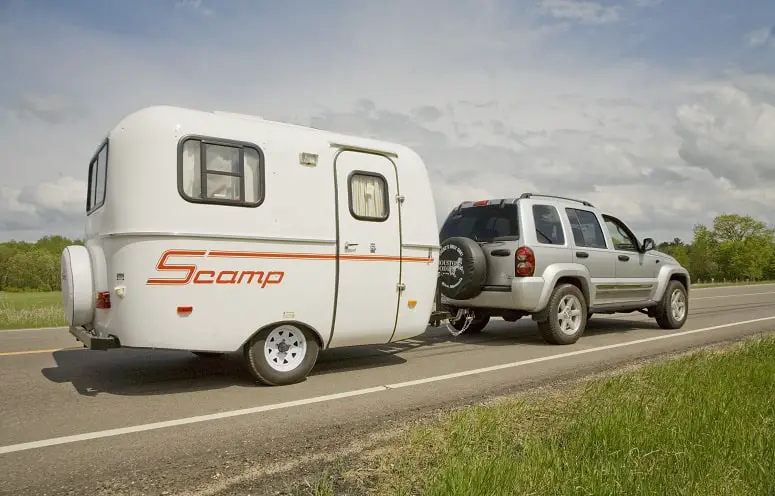
They range from smaller sizes (less than 18 feet long) to larger sizes up to 40 feet long, with lots of amenities.
Since national parks, on average, only allow 28-foot long RV vehicles, a travel trailer is a good choice for a trip to one of these. They average around 10 feet in width.
Most can be towed by more than one kind of vehicle. The smallest trailers can be towed by a regular car; other options are SUVs as an alternative to a pickup truck.
They usually have a standard hitch and are relatively lightweight, usually between 3,000 and 12,000 pounds.
Most have low clearance heights and will fit in harder to get at places, making them ideal for camping spots in rougher terrain.
Low clearance heights are an issue, for example, in mountain driving, where your vehicle has to fit through tunnels. It would be really bad to go on a trip and get stuck in a tunnel!
In most states, the height requirements for a trailer are about 13‒14 feet. The average travel trailer is about 10 feet high.
Most travel trailers have a normal turning radius, moving with the tow vehicle, making them easier to tow and drive around corners.
Travel trailers are easier to back in places and generally easier to drive around.
Parking them isn’t as difficult with smaller travel trailers; you can find more places to keep them when you’re not towing them.
Reasons To Choose A Travel Trailer
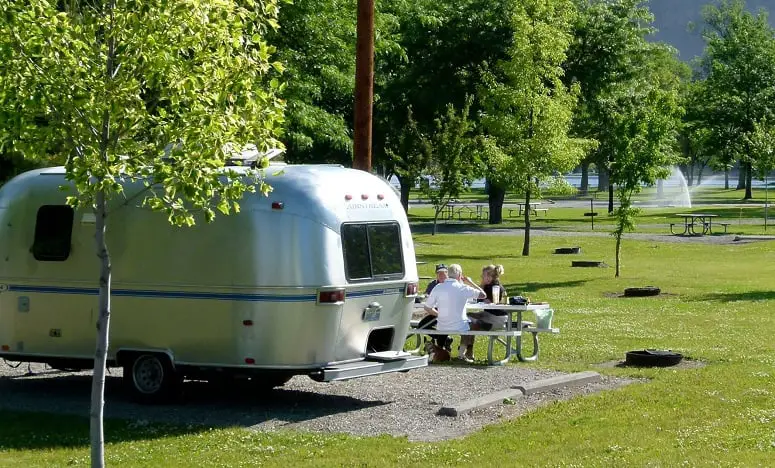
- Smaller, more maneuverable. A better choice for difficult terrain and small campsites.
- More options for your tow vehicle. You don’t necessarily need a pickup truck; you can use an SUV and take more people in your tow vehicle.
- Less expensive in terms of gas used; it is less heavy so you will use less gas towing it.
- Less wear and tear on your tow vehicle hauling it.
- Uses a standard hitch so you do not need to invest in a special hitch.
- Fewer maintenance costs.
- Overall, much less expensive than a fifth wheel. A budget of around $20,000 will suffice for the purchase of a middle of the road travel trailer. There are additional costs to this base price, like taxes, title, dealer fees, associated equipment, etc. so that is just a base price.
Reasons Not To Choose A Travel Trailer
- Limited space.
- Fewer options in terms of internal storage and living areas.
- Much less luxurious than most fifth wheels.
General Properties Of Fifth Wheels
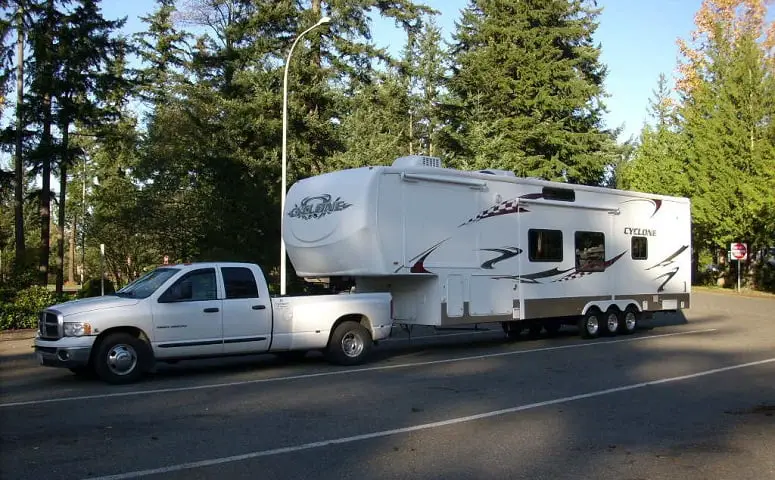
Fifth wheels are much heavier than travel trailers.
While super light models weighing around 3,000 pounds exist, they range upwards to 20,000 pounds. Most weigh between 12,000 and 15,000 pounds.
The heavy weight to be towed means you have to need a vehicle capable of towing it. This requires not only a pickup truck but one specced for the load.
The calculations include the towing capacity of the fifth wheel hitch, the towing capacity of the truck, and of course the load to be towed.
When buying a truck, you will need to consider long bed or short bed, diesel or gas. It’s been discovered by enthusiasts that long bed trucks and diesel engines work well for this task.
Researching the gear ratio is also important, as this affects the truck’s towing capacity.
An extremely important consideration when buying a truck is its payload capacity, which is basically the weight the truck can carry. Your truck will not just be towing a heavy load; it will be carrying people and cargo also.
There are various calculators online to help you consider and figure out all the factors.
Look for the truck’s payload capacity, which can be found in its dealer specs as the gross combined weight rating (GCWR).
This has to account for the following things: driver, passengers, cargo, and the pin weight of the fifth wheel hitch. You should be able to find the pin weight in the hitch specs.
If the approximate weight of all these things exceeds the GCWR, the truck will be overloaded and major disasters could occur.
There is a reason you see weigh stations on interstates for commercial vehicles; correct weight calculations are crucial to operate the vehicle safely.
An important consideration is the load capacity of the tires you buy. This is a number you must check.
Good tires with a high load capacity will boost the overall load capacity number, so if you have a heavier cargo weight, for example, that would balance it out.
An overloaded truck will tow poorly and put stress on the engine, transmission, and brakes. In mountain driving, you will go very slow and upset other drivers who will fountain around you.
It can get dangerous going up and down very steep inclines; you can burn out your brakes trying to stop from hurtling down a mountain!
The only other alternative to burning your brakes is low gear and that will strain your transmission. A combination of brakes and low gear is needed to get down some of those steep inclines.
If they are maximally stressed along with your engine, you will likely have a bad day. So doing the tow calculations correctly is crucial.
Fifth wheels are also much longer than travel trailers, with an average length of about 28 feet, but available up to about 40 feet. For best use, under 35 feet will get you in most national parks.
Fifth wheels are much larger inside and are often bilevel. The spaciousness means you have quite a luxurious home away from home.
Models with multiple rooms and bathrooms exist, obviously also with kitchens. This type of setup is really suitable for people who want to live in their RV full time.
There is generally a section that extends over the hitch. This is one of the reasons the fifth wheel hitch is needed, to balance this load.
The width of a fifth wheel can be 8+ feet, but you run the risk of breaking laws in various states if it is over 8-foot wide. So a good rule of thumb is your choice should be ≤ 8 feet.
5 Reasons To Choose A Fifth Wheel
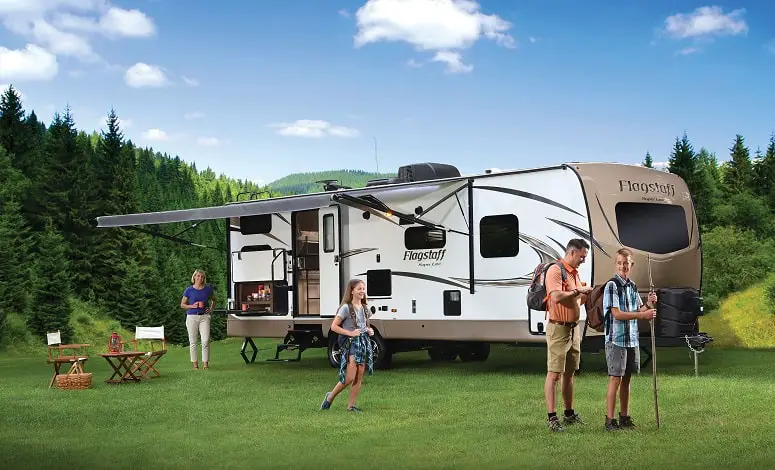
- Much more storage capacity. If you have kids, pets, and lots of stuff, this is the way to go.
- Fifth wheel hitch is able to handle much larger weight capacity. As this is the type of hitch used commercially by semi trailer trucks, it’s very secure and safe. Also smoother to use than a standard hitch.
- Has all hookups and you can have electricity and water inside your RV if you need to.
- Great if you plan to live in your RV, are camping with a large family, or need to haul a lot of stuff. It is literally a home you can haul around the country.
- Save money on a house payment, taxes, maintenance, HOA fees if you opt to live in it.
5 Reasons Not To Choose A Fifth Wheel
- Bigger size means usually needs higher clearance, larger parking spaces, so less maneuverable. Windy mountain roads may be a big problem.
- Bigger size means there are places you cannot take it. Smaller tighter camping spots would not be accessible. If you buy one too big and plan on using it to visit national parks, you will have a very hard time.
- You absolutely need a truck that can haul it, and need to check specs and do correct calculations to make sure your pickup truck is up to the job.
- Requires a fifth wheel hitch as a separate expense.
- More expensive in terms of maintenance, gas, wear and tear on your tow vehicle.
Quality Is Key
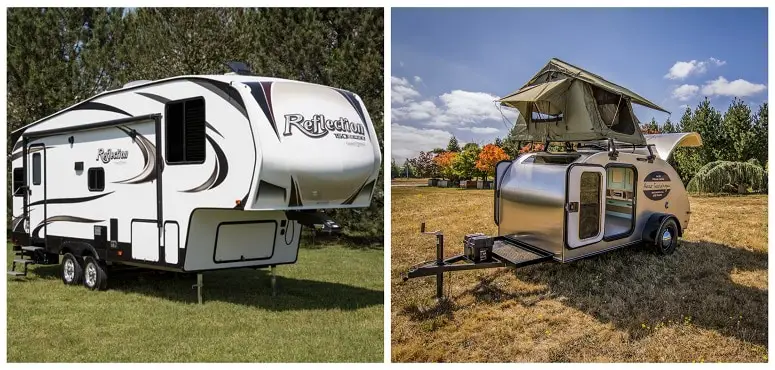
With so much to consider when you make your purchases, do not sacrifice quality of build for those cute cabinets in the kitchen. You want to make sure your new RV is well built and all the basics work well.
If you scrimp on that, you will be on the road with leaky faucets, lights that don’t work and maybe worse.
This is a vehicle that needs to carry you, your loved ones and belongings safely to your destination. It is your refuge from wildlife and the elements.
You will be spending most of your time in it and having to live with any problems pretty much. It needs to be high quality to do all that. So don’t undercut yourself or you will likely regret it in the long run.
Conclusion
There is a lot to think about when choosing an RV, but the payoff can be very rewarding.
Making cherished memories with your loved ones, seeing the country inexpensively, following your dreams and experiencing the glory of nature, these have no price.
Hopefully, this information has helped you take your dream closer to glorious reality.


